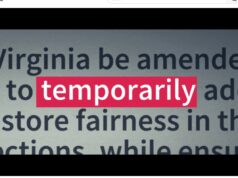by Cindy
With the end of the General Assembly session comes the rollout of the VPAP “batting averages” –statistics that purport to measure “the success rate of each legislator.” Benjamin Disraeli famously said, “there are three kinds of lies: lies, damned lies, and statistics,” and that most certainly includes VPAP’s “batting averages.” What VPAP presents is a measure of how many bills a legislator passed, as a percent of the number she filed. The problem is that this metric implies – but is by no means a measure of – the success or failure of a legislator.
Here’s why I say that. There are many, many ways that a legislator might end up with a low “batting average” on the VPAP scorecard. The legislator might, in fact, put in lots of ill-conceived bills–ideas that haven’t really been thought through very well, poorly designed plays. Take, for example, Delegate Cole’s (R-88) bill to have the State Corporation Commission regulate social media websites to prevent Twitter from censoring hate speech. That was such a stupid bill that even the seven Republicans on his own stacked subcommittee “balked” at moving to report the bill, so it “was called out” for lack of motion! STRIKE!
But a legislator might also end up with a low score by putting in lots of controversial or partisan bills. For example, every year Democratic legislators put in bills to require universal background checks to purchase firearms, to end the statutory ban on same sex marriages, to prevent LGBTQ discrimination in housing practices, etc. Every year, Democrats write a bill to ratify the ERA. While these bills fail every year, on mostly party-line votes, legislators continue to file them every year because: 1) constituents expect them to; and 2) the votes cast on these bills continue to be used to hold other legislators accountable, and to motivate the base. Similarly, a legislator might put in bills that are too ambitious, too big and bold, too complicated a play. Sometimes these bills are meant to be a statement (a brushback pitch, for instance), or perhaps are meant to be the beginning of a conversation or the first pass at taking the temperature of the General Assembly on an issue. But it’s also understood that these bills won’t “score” on their first “at bat.” I think of these as pop flys, or maybe foul balls.
Now here’s where the VPAP “batting average” really heads into foul territory. Another way that legislators end up with low scores is that those in the majority – the Republicans in this case – use the entire process as a political tool or a punitive tool. Instead of their votes on a bill reflecting its merits, their votes reflect whether they like the patron, whether they want the patron to have a low “success rate” so that it’s easier to win back that seat next season…er, election, whether they are angry at the patron for having made a statement or floor speech last week that they didn’t like. Yep, this is your legislature, elected to represent you in the oldest continuously-serving legislative body in America, playing petty and vindictive “ballgames,” instead of doing their job. So, that is what in baseball terms? That’s like one team – the ones in red – getting to use wood or aluminum bats, and the other team – the ones in blue – having to use whiffle ball bats, I guess? Or one team (the Democrats in this case) having to step up to the plate with two strikes already called against them?
On the flip side, a sure way to get a high score is to put in a lot of relatively sleepy little bills–clean up some badly-worded or vague section of the code, solve some minor local problem, be the patron of one of the many, many bills that are voted through unanimously–”in the uncontested block.” There is nothing at all wrong with this–it’s not like this job has to be all glamour and drama – grand slams, stretching a double into a triple, stealing home, etc. Important things that affect real people’s lives happen in those bills too. But it may be hard to get the kind of public attention from those bills that really help a legislator win re-election too. SINGLE.
Lastly, a legislator may get a high score for having a good sense of what can or cannot pass, for working hard with stakeholders and other legislators before and during the process to tweak the language so that it will have as little opposition as possible, for being willing to amend on the fly as needed. Think of this as playing good, smart, fundamentally sound baseball.
I’m not trying to say here that VPAP is purposely distorting anything with their “batting average.” But just like a win-loss record is a poor measure of how your pitcher did, and how “advanced sabermetrics” are far more revealing, this VPAP “batting average” is a poor metric for how our legislators did. In fact, legislators’ “hits” and “misses” can result from too many different things, only a few of which reflect on their abilities or how hard they worked. Worse, it’s terribly misleading to call a Democratic legislator unsuccessful – let alone a bad ballplayer – for failing to pass bills that Republicans voted against in order to make that Democratic legislator look unsuccessful…and possibly not get “re-signed”/re-elected next season/session. For all those reasons, VPAP’s “batting average” scorecard mostly swings and misses.




![[UPDATED with Map] Report by Brandon Jarvis: VA “General Assembly Democrats have reached agreement on a 10-1 map”; “Sen. Lucas says the maps are competitive”](https://bluevirginia.us/wp-content/uploads/2026/02/shirazi101-238x178.jpg)







